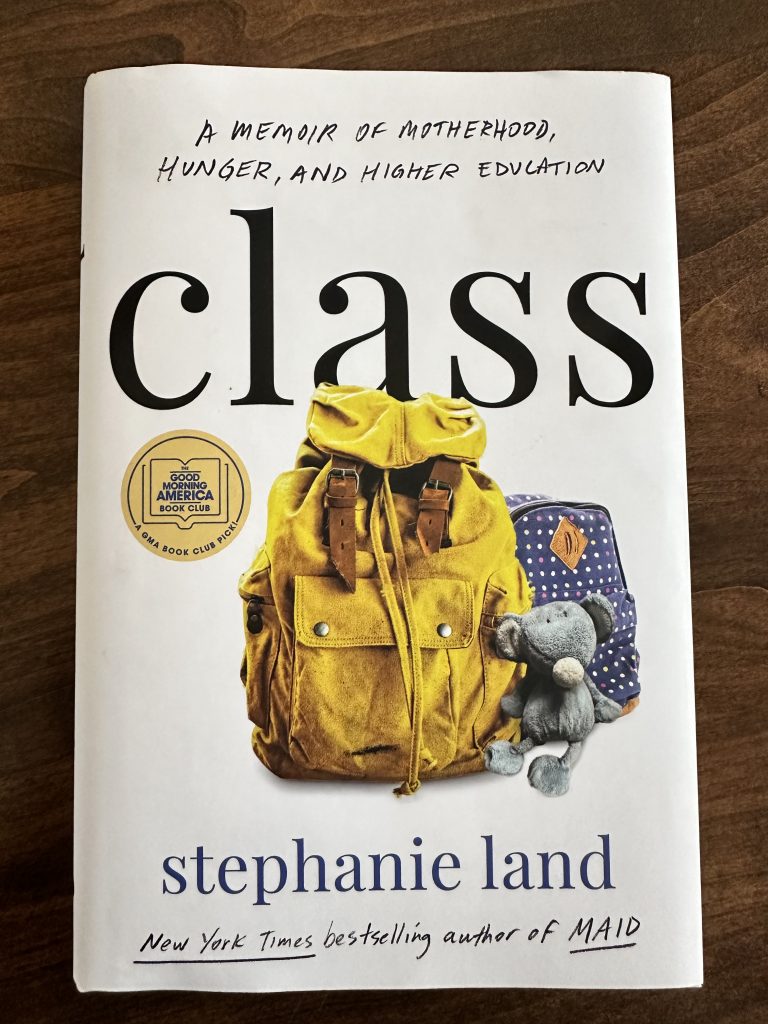
*Spoilers*
I love a good double meaning and the title of this book is just that. Class refers to the actual classes author Stephanie Land attends while working toward her degree, as well as her status in society, and that realization becomes very clear very quickly. Land is a single mother who is doing everything she can to earn her degree and become a writer, but has no one to rely on but herself. She has a fractured relationship with her family, a young daughter (Emilia) who she adores, and a baby daddy (not my favorite term but is the most accurate description of him) who is abusive and cruel. As a result, she is food insecure, has to count every penny, use food stamps, and constantly move. “I couldn’t think of the last time anyone has been this helpful.” Land’s story is fraught with heartbreak but also resilience as she fights to keep her daughter educated, happy, and stable while dealing with red tape, people who do not believe education should be her priority, and those who judge her for a variety or reasons.
As a writer and an educator, Class was definitely worth my time because there’s something to be said about reading about someone ’s struggle to get through college to become a writer. Additionally, this book is one of those narratives that pulls off the ultimate trick – it is captivating even though we know how things turn out. In Land’s case, we already know she becomes a successful writer with a bestselling book under her belt, but learning about her journey to achieve that success is what is so compelling. For example, the part where she realizes the importance of workshopping during one of her classes: “We’d get to talking about what we were working on, and I discovered how essential that was to the writing process.”
While most of Land’s narrative is poignant, well-written, and thoughtful, there are some parts where she lost me a bit. For example, on page 127 she goes into a whole diatribe about her birth control and PTSD – a lot of information spilled out very quickly which unfortunately reads more like a list of excuses than an explanation of her past. Then on page 168, the author goes into full defense mode as she makes excuses for why it was a good idea for a person already on food stamps to have a second (unplanned) baby. Later she adds, “I didn’t have the energy to answer questions about my plans or why having another child was even a possibility for me, or how I thought I would work it all out.”
I want to tread lightly here because I’m in no position to judge anyone or tell anyone how to live but, after spending 167 pages empathizing with Land, I then read that following an abortion (which she points out was the best choice for many reasons) she gets pregnant again and decides to have the second kid. Of course she has the right to have a baby, but she has to also understand why the people around her at the time (and me as a current reader) were shocked to hear that someone already counting pennies, experiencing food insecurity, and lacking any help at home, was having another kid.
That being said, my heart went out to her when I read about how, including while she was pregnant, most of her time spent as a mother was “weighing the pros and cons between a horrible and not-so-great situation.” Being a mom is hard and she really did her best with Emilia and she should be proud of that. Also, she wrote a best-selling book called Maid and Class will probably become a bestseller as well. In real time I know that Land did it – she persevered and became the writer she always wanted to be – and that makes me happy.
Quotes:
“Once again, my pursuit of higher education and with it the dreams of being a writer, everything I had worked so hard for, seemed like purchasing a fresh-off-the-lot, overpriced car.”
“I couldn’t allow myself to reach a point where it would be a huge upset if that person didn’t show up when I needed them to.”
She does a good job of summing up essay writing in one sentence: “A certain number of required words in a certain format with an added number of ways I could prove my opinion by showing someone else had the same one.”
Most parents can understand this to a degree: “Everything I did to keep our life running smoothly or to get me closer to graduation felt necessary but endless, like I wasn’t totally sure I would ever escape the grind.”
“The purest form of love I had experienced came from becoming a mother.” ❤️
“I fell in love with the act of surrendering to stability.”
G.K. Chesterton: “Fairy tales are more than true: not because they tell us that dragons exist, but because they tell us dragons can be beaten.”


Leave a Reply